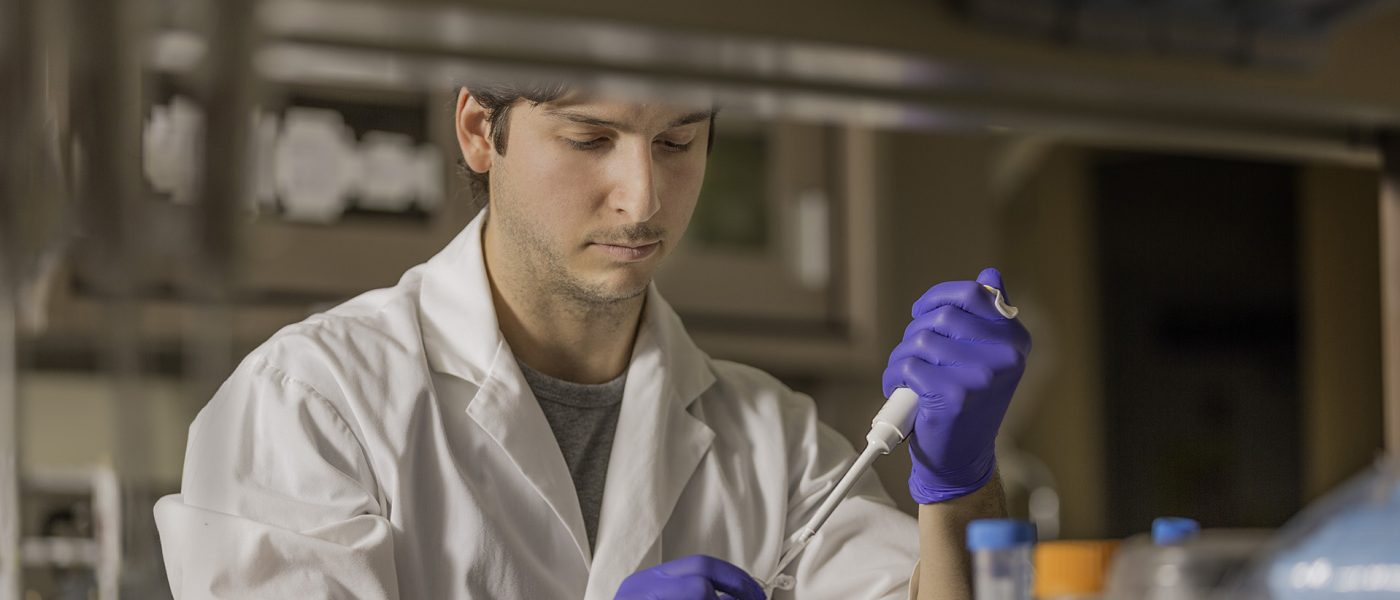Integrative Physiology
Faculty who study Integrative Physiology are broadly interested in the effects of exercise on the regulation of the cardiovascular and neuromuscular systems, including the influence of physical training and nutrition, in both healthy and diseased states.
Areas of specific focus include human performance, clinical exercise physiology, metabolic regulation, exercise rehabilitation, neuromuscular disorders, cardiovascular function, stem cell biology, aging and sarcopenia.
Research methods and techniques include the application cellular and molecular analyses of biological tissue samples, stable isotope tracer technology, Doppler ultrasound, histochemistry, electrophysiology and metabolic measurements.
Information Box Group
Baraa Al-Khazraji
Assistant Professor
Dr. Al-Khazraji’s laboratory focuses on exploring blood flow control and vascular physiology in peripheral and cerebral blood vessels. Research interests include: 1) investigating how blood flow is controlled at rest and during cardiovascular challenges such as dynamic exercise,2) understanding vascular health in a range of populations including healthy young individuals to those either at-risk of a vascular-related incident or from a clinical population, 3) how exercise training impacts vascular health, and4) how to expand utility of current vascular imaging tools
Kirsten Bell
Assistant Professor
Research
My research seeks to better understand the relationship between nutrition (especially dietary fats) and metabolic health in adults with breast cancer. Unhealthy metabolic changes develop and worsen during the breast cancer trajectory (diagnosis, treatment, survivorship), often leading to the diagnosis of co-morbidities, like type 2 diabetes and even cancer recurrence, once patients enter survivorship. We do not fully understand why breast cancer patients are predisposed to these metabolic perturbations, but it may be related to certain cancer treatments (e.g., chemotherapy, hormone therapy) or even cancer itself. Cancerous tumours consume fuel (like glucose and lipids) at accelerated rates compared to normal cells, which may impact the metabolic regulation of host tissues, like skeletal muscle.
Students in my laboratory:
- Manipulate circulating lipids to uncover the mechanisms linking lipid availability and skeletal muscle glucose dysregulation in cancer and non-cancer populations,
- Apply fat-based nutrition interventions (e.g., omega-3 supplementation) to improve features of glucose metabolism in adults with breast cancer, and
- Test and develop innovative ultrasound-based techniques to non-invasively assess muscle fat infiltration and metabolic health
I am currently accepting graduate students for Fall 2022. If you are interested in graduate work, please contact me at bellke3@mcmaster.ca.
![]() I am committed to building and supporting an equitable, inclusive, diverse, and accessible lab environment. Members of equity-deserving groups, including (but not limited to) racialized, 2SLGBTQIA+, neurodivergent, and disabled communities, are encouraged to apply for research opportunities in my lab.
I am committed to building and supporting an equitable, inclusive, diverse, and accessible lab environment. Members of equity-deserving groups, including (but not limited to) racialized, 2SLGBTQIA+, neurodivergent, and disabled communities, are encouraged to apply for research opportunities in my lab.
Research Interests
Cancer; Nutrition; Dietary fat; Glucose metabolic health; Skeletal muscle; Body composition; Ultrasound
Anthea Christoforou
Assistant Professor
The overarching goal of my research is to examine how nutrition and other chronic disease prevention policies impact on our diets and health. This is a critical time for population health and chronic disease prevention both in Canada and globally. A broad range of food and nutrition policies aimed at improving diets have recently been implemented or proposed (e.g., efforts to reduce sodium and added sugars in our food supply, warning labels for foods high in nutrients of concern, standards for food-like natural health products). These efforts also aim to harmonize parallel policy efforts which target other modifiable risk factors of non-communicable diseases (NCDs) such as guidance for physical activity and those which aim to support healthy aging. My research program draws on a variety of data sources such as food availability data, population level health surveys (e.g., Canadian Community Health Survey, Canadian Health Measures Survey, US National Health and Nutrition Examination Survey) as well as consumer awareness studies to assess the intended and unintended consequences of these efforts while also making important considerations of existing health and nutrition inequalities in our population. Although the research in my lab primarily leverages current and emergent methodologies in nutritional epidemiology, it also integrates research approaches from health economics, chronic disease physiology and social and behavior sciences and includes close collaborations with Health Canada, the WHO, and other policy actors. If you’re interested in learning more about the research conducted in my lab as well as available research opportunities, please contact me at chrisa30@mcmaster.ca
Martin Gibala
Professor; Faculty Of Science Research Chair
My research examines the integrative physiology of exercise at the molecular to whole body level in both healthy individuals and people with chronic diseases. In addition to basic, mechanistic studies on the regulation of skeletal muscle energy provision, my laboratory conducts applied research that examines the impact of physical training and dietary manipulation on human health and performance. Our recent work has largely focused on the physiological adaptations to intermittent exercise (interval training) and the associated health impacts. I am also interested in science communication and coauthored a bestselling book on the science of time-efficient exercise, The One-Minute Workout: Science Shows a Way to Get Fit That’s Smarter, Faster, Shorter (Penguin Random House, 2017).

Martin Gibala
Professor; Faculty Of Science Research Chair
Vladimir Ljubicic
Associate Professor; Canada Research Chair (Tier 2) in Neuromuscular Plasticity in Health and Disease
Neuromuscular plasticity refers to the remodeling of the neuromuscular system in response to genetic or environmental cues. Neuromuscular disorders, including the neuromuscular alterations that are hallmarks of advanced aging, are more common in Canada then generally appreciated. The central experimental questions that form the foundation of our research program are: 1) What roles do phenotype-modifying proteins play in the maintenance and remodeling of the peripheral neuromuscular system, and 2) Are these molecules efficacious therapeutic targets for neuromuscular disorders? To address these questions, we design investigations around rational lifestyle- and pharmacological-based strategies focused on the manipulation of powerful phenotype-bending molecules in the neuromuscular system. Furthermore, we employ an integrative and rigorous cell-to-animal experimental approach, as well as an innovative combination of molecular physiological solutions. The long-term goal of our research is to expand fundamental understanding of the mechanisms governing neuromuscular plasticity, as well as to identify novel, evidence-based therapeutic strategies to improve the lives of those with compromised neuromuscular systems.

Vladimir Ljubicic
Associate Professor; Canada Research Chair (Tier 2) in Neuromuscular Plasticity in Health and Disease
Maureen MacDonald
Professor; Dean, Faculty of Science
Most of us realize that our blood vessels play an important role in transporting blood to and from all of the tissues of our body. The human cardiovascular system is continually adapting to and co-coordinating the differing requirements of the body tissues and the energy demands of skeletal muscle alone are capable of changing 100 fold within seconds of the onset of a new task. Blood vessels are much more than static tubes for transporting blood. The structure and function of our blood vessels can adapt to challenges they are presented with and can change significantly in both health and disease. Two important features of our arteries (blood vessels which transport blood away from the heart) are how flexible (stiffness) they are and how much they can expand (dilate) when faced with the challenges of increasing pressure and/or flow. We know that these two features, stiffness and dilation, change with disease processes, aging, spinal cord injury and some exercise programs but we know very little about what regulates these changes. In my laboratory we have been studying the role that exercise, which can result in large pressure and flow challenges to the arteries, plays in changing arterial structure and function. We examine the responses of a variety of components of the cardiovascular system to exercise challenges in order to determine control mechanisms. The specific cardiovascular variables, which are central to this research, are blood pressure, blood flow and arterial stiffness, diameter, wall thickness and dilation. Objectives of my research program include examination of the impact of alterations in vessel stiffness and function on skeletal muscle blood flow responses both at rest, and during exercise. Our continuing studies will focus on the use of cutting edge ultrasound technology to examine blood vessel stiffness and regional blood flow in both healthy and clinical populations. The insight gained from these studies will assist in advancing the current basic knowledge of the cardiovascular system as well as identifying the effectiveness of exercise as an intervention in determining basic cardiovascular regulation and in improving health status and lifestyle.
Gianni Parise
Professor; Acting Dean, Faculty of Science
Generally, my interests involve understanding the mechanisms of skeletal muscle adaptation and repair to exercise and injury. We focus primarily on skeletal muscle progenitor cells and their role in remodelling of tissue. Additionally, we focus on how muscle progenitor cells fails in aging and examine strategies to rejuvenate the muscle progenitor response to injury and exercise in older adults.
Stuart Phillips
Professor; Director, McMaster Centre for Nutrition, Exercise, and Health Research; Canada Research Chair (Tier 1)
Professor Phillips is a Tier 1 Canada Research Chair in Skeletal Muscle Health in Aging. He is a Professor in Kinesiology, and Graduate Faculty in the School of Medicine at McMaster University. He is a fellow of the Canadian Academy of Health Sciences (FCAHS) and the American College of Sports Medicine (ACSM). His research is focused on the impact of nutrition and exercise on the mechanisms of human skeletal muscle protein turnover. He is also keenly interested in diet- and exercise-induced changes in body composition particularly in older persons.His research is funded by the Canadian Institutes for Health Research, the National Science and Engineering Council of Canada, the Canadian Foundation for Innovation, the US NIH, the USDA, and several industry partners.Dr. Phillips was the inaugural recipient of the Enzo Cafarelli Graduate Mentor Award in 2017. He was named to Clarivate’s Highly Cited Award in 2018-2021 as one of the top 1% of all cited researchers in physiology and nutrition. He has more than 50,000 citations and an h-index of 121; https://scholar.google.ca/citations?user=VLu9hqgAAAAJ&hl=en

Stuart Phillips
Professor; Director, McMaster Centre for Nutrition, Exercise, and Health Research; Canada Research Chair (Tier 1)
Jeremy Walsh
Assistant Professor
Dr. Walsh’s research is focused on investigating the mechanisms by which daily behaviours (physical activity, diet, screen time, sleep and cognitive stimulation) impact brain function. The overarching goal of this research is to apply this knowledge to develop interventions that optimize brain health across the lifespan. Dr. Walsh’s research is particularly interested in characterizing how exercise increases the neuroactive hormone brain-derived neurotrophic factor (BDNF), and investigating the effect of BDNF on brain function. The primary measurement outcomes of this research are: 1) measuring neuroactive hormones in the blood, 2) assessing cognitive function, 3) measuring cerebral blood flow.Dr. Walsh is currently accepting graduate students for Fall 2021. If you are interested in a research opportunity with Dr. Walsh, please fill out an application here.
Baraa Al-Khazraji
Assistant Professor
Dr. Al-Khazraji’s laboratory focuses on exploring blood flow control and vascular physiology in peripheral and cerebral blood vessels. Research interests include: 1) investigating how blood flow is controlled at rest and during cardiovascular challenges such as dynamic exercise,2) understanding vascular health in a range of populations including healthy young individuals to those either at-risk of a vascular-related incident or from a clinical population, 3) how exercise training impacts vascular health, and4) how to expand utility of current vascular imaging tools
Baraa Al-Khazraji
Assistant Professor
Dr. Al-Khazraji’s laboratory focuses on exploring blood flow control and vascular physiology in peripheral and cerebral blood vessels. Research interests include: 1) investigating how blood flow is controlled at rest and during cardiovascular challenges such as dynamic exercise,2) understanding vascular health in a range of populations including healthy young individuals to those either at-risk of a vascular-related incident or from a clinical population, 3) how exercise training impacts vascular health, and4) how to expand utility of current vascular imaging tools
Kirsten Bell
Assistant Professor
Research
My research seeks to better understand the relationship between nutrition (especially dietary fats) and metabolic health in adults with breast cancer. Unhealthy metabolic changes develop and worsen during the breast cancer trajectory (diagnosis, treatment, survivorship), often leading to the diagnosis of co-morbidities, like type 2 diabetes and even cancer recurrence, once patients enter survivorship. We do not fully understand why breast cancer patients are predisposed to these metabolic perturbations, but it may be related to certain cancer treatments (e.g., chemotherapy, hormone therapy) or even cancer itself. Cancerous tumours consume fuel (like glucose and lipids) at accelerated rates compared to normal cells, which may impact the metabolic regulation of host tissues, like skeletal muscle.
Students in my laboratory:
- Manipulate circulating lipids to uncover the mechanisms linking lipid availability and skeletal muscle glucose dysregulation in cancer and non-cancer populations,
- Apply fat-based nutrition interventions (e.g., omega-3 supplementation) to improve features of glucose metabolism in adults with breast cancer, and
- Test and develop innovative ultrasound-based techniques to non-invasively assess muscle fat infiltration and metabolic health
I am currently accepting graduate students for Fall 2022. If you are interested in graduate work, please contact me at bellke3@mcmaster.ca.
![]() I am committed to building and supporting an equitable, inclusive, diverse, and accessible lab environment. Members of equity-deserving groups, including (but not limited to) racialized, 2SLGBTQIA+, neurodivergent, and disabled communities, are encouraged to apply for research opportunities in my lab.
I am committed to building and supporting an equitable, inclusive, diverse, and accessible lab environment. Members of equity-deserving groups, including (but not limited to) racialized, 2SLGBTQIA+, neurodivergent, and disabled communities, are encouraged to apply for research opportunities in my lab.
Research Interests
Cancer; Nutrition; Dietary fat; Glucose metabolic health; Skeletal muscle; Body composition; Ultrasound
Kirsten Bell
Assistant Professor
Research
My research seeks to better understand the relationship between nutrition (especially dietary fats) and metabolic health in adults with breast cancer. Unhealthy metabolic changes develop and worsen during the breast cancer trajectory (diagnosis, treatment, survivorship), often leading to the diagnosis of co-morbidities, like type 2 diabetes and even cancer recurrence, once patients enter survivorship. We do not fully understand why breast cancer patients are predisposed to these metabolic perturbations, but it may be related to certain cancer treatments (e.g., chemotherapy, hormone therapy) or even cancer itself. Cancerous tumours consume fuel (like glucose and lipids) at accelerated rates compared to normal cells, which may impact the metabolic regulation of host tissues, like skeletal muscle.
Students in my laboratory:
- Manipulate circulating lipids to uncover the mechanisms linking lipid availability and skeletal muscle glucose dysregulation in cancer and non-cancer populations,
- Apply fat-based nutrition interventions (e.g., omega-3 supplementation) to improve features of glucose metabolism in adults with breast cancer, and
- Test and develop innovative ultrasound-based techniques to non-invasively assess muscle fat infiltration and metabolic health
I am currently accepting graduate students for Fall 2022. If you are interested in graduate work, please contact me at bellke3@mcmaster.ca.
![]() I am committed to building and supporting an equitable, inclusive, diverse, and accessible lab environment. Members of equity-deserving groups, including (but not limited to) racialized, 2SLGBTQIA+, neurodivergent, and disabled communities, are encouraged to apply for research opportunities in my lab.
I am committed to building and supporting an equitable, inclusive, diverse, and accessible lab environment. Members of equity-deserving groups, including (but not limited to) racialized, 2SLGBTQIA+, neurodivergent, and disabled communities, are encouraged to apply for research opportunities in my lab.
Research Interests
Cancer; Nutrition; Dietary fat; Glucose metabolic health; Skeletal muscle; Body composition; Ultrasound
Anthea Christoforou
Assistant Professor
The overarching goal of my research is to examine how nutrition and other chronic disease prevention policies impact on our diets and health. This is a critical time for population health and chronic disease prevention both in Canada and globally. A broad range of food and nutrition policies aimed at improving diets have recently been implemented or proposed (e.g., efforts to reduce sodium and added sugars in our food supply, warning labels for foods high in nutrients of concern, standards for food-like natural health products). These efforts also aim to harmonize parallel policy efforts which target other modifiable risk factors of non-communicable diseases (NCDs) such as guidance for physical activity and those which aim to support healthy aging. My research program draws on a variety of data sources such as food availability data, population level health surveys (e.g., Canadian Community Health Survey, Canadian Health Measures Survey, US National Health and Nutrition Examination Survey) as well as consumer awareness studies to assess the intended and unintended consequences of these efforts while also making important considerations of existing health and nutrition inequalities in our population. Although the research in my lab primarily leverages current and emergent methodologies in nutritional epidemiology, it also integrates research approaches from health economics, chronic disease physiology and social and behavior sciences and includes close collaborations with Health Canada, the WHO, and other policy actors. If you’re interested in learning more about the research conducted in my lab as well as available research opportunities, please contact me at chrisa30@mcmaster.ca
Anthea Christoforou
Assistant Professor
The overarching goal of my research is to examine how nutrition and other chronic disease prevention policies impact on our diets and health. This is a critical time for population health and chronic disease prevention both in Canada and globally. A broad range of food and nutrition policies aimed at improving diets have recently been implemented or proposed (e.g., efforts to reduce sodium and added sugars in our food supply, warning labels for foods high in nutrients of concern, standards for food-like natural health products). These efforts also aim to harmonize parallel policy efforts which target other modifiable risk factors of non-communicable diseases (NCDs) such as guidance for physical activity and those which aim to support healthy aging. My research program draws on a variety of data sources such as food availability data, population level health surveys (e.g., Canadian Community Health Survey, Canadian Health Measures Survey, US National Health and Nutrition Examination Survey) as well as consumer awareness studies to assess the intended and unintended consequences of these efforts while also making important considerations of existing health and nutrition inequalities in our population. Although the research in my lab primarily leverages current and emergent methodologies in nutritional epidemiology, it also integrates research approaches from health economics, chronic disease physiology and social and behavior sciences and includes close collaborations with Health Canada, the WHO, and other policy actors. If you’re interested in learning more about the research conducted in my lab as well as available research opportunities, please contact me at chrisa30@mcmaster.ca
Martin Gibala
Professor; Faculty Of Science Research Chair
My research examines the integrative physiology of exercise at the molecular to whole body level in both healthy individuals and people with chronic diseases. In addition to basic, mechanistic studies on the regulation of skeletal muscle energy provision, my laboratory conducts applied research that examines the impact of physical training and dietary manipulation on human health and performance. Our recent work has largely focused on the physiological adaptations to intermittent exercise (interval training) and the associated health impacts. I am also interested in science communication and coauthored a bestselling book on the science of time-efficient exercise, The One-Minute Workout: Science Shows a Way to Get Fit That’s Smarter, Faster, Shorter (Penguin Random House, 2017).
Martin Gibala
Professor; Faculty Of Science Research Chair
My research examines the integrative physiology of exercise at the molecular to whole body level in both healthy individuals and people with chronic diseases. In addition to basic, mechanistic studies on the regulation of skeletal muscle energy provision, my laboratory conducts applied research that examines the impact of physical training and dietary manipulation on human health and performance. Our recent work has largely focused on the physiological adaptations to intermittent exercise (interval training) and the associated health impacts. I am also interested in science communication and coauthored a bestselling book on the science of time-efficient exercise, The One-Minute Workout: Science Shows a Way to Get Fit That’s Smarter, Faster, Shorter (Penguin Random House, 2017).
Vladimir Ljubicic
Associate Professor; Canada Research Chair (Tier 2) in Neuromuscular Plasticity in Health and Disease
Neuromuscular plasticity refers to the remodeling of the neuromuscular system in response to genetic or environmental cues. Neuromuscular disorders, including the neuromuscular alterations that are hallmarks of advanced aging, are more common in Canada then generally appreciated. The central experimental questions that form the foundation of our research program are: 1) What roles do phenotype-modifying proteins play in the maintenance and remodeling of the peripheral neuromuscular system, and 2) Are these molecules efficacious therapeutic targets for neuromuscular disorders? To address these questions, we design investigations around rational lifestyle- and pharmacological-based strategies focused on the manipulation of powerful phenotype-bending molecules in the neuromuscular system. Furthermore, we employ an integrative and rigorous cell-to-animal experimental approach, as well as an innovative combination of molecular physiological solutions. The long-term goal of our research is to expand fundamental understanding of the mechanisms governing neuromuscular plasticity, as well as to identify novel, evidence-based therapeutic strategies to improve the lives of those with compromised neuromuscular systems.
Vladimir Ljubicic
Associate Professor; Canada Research Chair (Tier 2) in Neuromuscular Plasticity in Health and Disease
Neuromuscular plasticity refers to the remodeling of the neuromuscular system in response to genetic or environmental cues. Neuromuscular disorders, including the neuromuscular alterations that are hallmarks of advanced aging, are more common in Canada then generally appreciated. The central experimental questions that form the foundation of our research program are: 1) What roles do phenotype-modifying proteins play in the maintenance and remodeling of the peripheral neuromuscular system, and 2) Are these molecules efficacious therapeutic targets for neuromuscular disorders? To address these questions, we design investigations around rational lifestyle- and pharmacological-based strategies focused on the manipulation of powerful phenotype-bending molecules in the neuromuscular system. Furthermore, we employ an integrative and rigorous cell-to-animal experimental approach, as well as an innovative combination of molecular physiological solutions. The long-term goal of our research is to expand fundamental understanding of the mechanisms governing neuromuscular plasticity, as well as to identify novel, evidence-based therapeutic strategies to improve the lives of those with compromised neuromuscular systems.
Maureen MacDonald
Professor; Dean, Faculty of Science
Most of us realize that our blood vessels play an important role in transporting blood to and from all of the tissues of our body. The human cardiovascular system is continually adapting to and co-coordinating the differing requirements of the body tissues and the energy demands of skeletal muscle alone are capable of changing 100 fold within seconds of the onset of a new task. Blood vessels are much more than static tubes for transporting blood. The structure and function of our blood vessels can adapt to challenges they are presented with and can change significantly in both health and disease. Two important features of our arteries (blood vessels which transport blood away from the heart) are how flexible (stiffness) they are and how much they can expand (dilate) when faced with the challenges of increasing pressure and/or flow. We know that these two features, stiffness and dilation, change with disease processes, aging, spinal cord injury and some exercise programs but we know very little about what regulates these changes. In my laboratory we have been studying the role that exercise, which can result in large pressure and flow challenges to the arteries, plays in changing arterial structure and function. We examine the responses of a variety of components of the cardiovascular system to exercise challenges in order to determine control mechanisms. The specific cardiovascular variables, which are central to this research, are blood pressure, blood flow and arterial stiffness, diameter, wall thickness and dilation. Objectives of my research program include examination of the impact of alterations in vessel stiffness and function on skeletal muscle blood flow responses both at rest, and during exercise. Our continuing studies will focus on the use of cutting edge ultrasound technology to examine blood vessel stiffness and regional blood flow in both healthy and clinical populations. The insight gained from these studies will assist in advancing the current basic knowledge of the cardiovascular system as well as identifying the effectiveness of exercise as an intervention in determining basic cardiovascular regulation and in improving health status and lifestyle.
Maureen MacDonald
Professor; Dean, Faculty of Science
Most of us realize that our blood vessels play an important role in transporting blood to and from all of the tissues of our body. The human cardiovascular system is continually adapting to and co-coordinating the differing requirements of the body tissues and the energy demands of skeletal muscle alone are capable of changing 100 fold within seconds of the onset of a new task. Blood vessels are much more than static tubes for transporting blood. The structure and function of our blood vessels can adapt to challenges they are presented with and can change significantly in both health and disease. Two important features of our arteries (blood vessels which transport blood away from the heart) are how flexible (stiffness) they are and how much they can expand (dilate) when faced with the challenges of increasing pressure and/or flow. We know that these two features, stiffness and dilation, change with disease processes, aging, spinal cord injury and some exercise programs but we know very little about what regulates these changes. In my laboratory we have been studying the role that exercise, which can result in large pressure and flow challenges to the arteries, plays in changing arterial structure and function. We examine the responses of a variety of components of the cardiovascular system to exercise challenges in order to determine control mechanisms. The specific cardiovascular variables, which are central to this research, are blood pressure, blood flow and arterial stiffness, diameter, wall thickness and dilation. Objectives of my research program include examination of the impact of alterations in vessel stiffness and function on skeletal muscle blood flow responses both at rest, and during exercise. Our continuing studies will focus on the use of cutting edge ultrasound technology to examine blood vessel stiffness and regional blood flow in both healthy and clinical populations. The insight gained from these studies will assist in advancing the current basic knowledge of the cardiovascular system as well as identifying the effectiveness of exercise as an intervention in determining basic cardiovascular regulation and in improving health status and lifestyle.
Gianni Parise
Professor; Acting Dean, Faculty of Science
Generally, my interests involve understanding the mechanisms of skeletal muscle adaptation and repair to exercise and injury. We focus primarily on skeletal muscle progenitor cells and their role in remodelling of tissue. Additionally, we focus on how muscle progenitor cells fails in aging and examine strategies to rejuvenate the muscle progenitor response to injury and exercise in older adults.
Gianni Parise
Professor; Acting Dean, Faculty of Science
Generally, my interests involve understanding the mechanisms of skeletal muscle adaptation and repair to exercise and injury. We focus primarily on skeletal muscle progenitor cells and their role in remodelling of tissue. Additionally, we focus on how muscle progenitor cells fails in aging and examine strategies to rejuvenate the muscle progenitor response to injury and exercise in older adults.
Stuart Phillips
Professor; Director, McMaster Centre for Nutrition, Exercise, and Health Research; Canada Research Chair (Tier 1)
Professor Phillips is a Tier 1 Canada Research Chair in Skeletal Muscle Health in Aging. He is a Professor in Kinesiology, and Graduate Faculty in the School of Medicine at McMaster University. He is a fellow of the Canadian Academy of Health Sciences (FCAHS) and the American College of Sports Medicine (ACSM). His research is focused on the impact of nutrition and exercise on the mechanisms of human skeletal muscle protein turnover. He is also keenly interested in diet- and exercise-induced changes in body composition particularly in older persons.His research is funded by the Canadian Institutes for Health Research, the National Science and Engineering Council of Canada, the Canadian Foundation for Innovation, the US NIH, the USDA, and several industry partners.Dr. Phillips was the inaugural recipient of the Enzo Cafarelli Graduate Mentor Award in 2017. He was named to Clarivate’s Highly Cited Award in 2018-2021 as one of the top 1% of all cited researchers in physiology and nutrition. He has more than 50,000 citations and an h-index of 121; https://scholar.google.ca/citations?user=VLu9hqgAAAAJ&hl=en
Stuart Phillips
Professor; Director, McMaster Centre for Nutrition, Exercise, and Health Research; Canada Research Chair (Tier 1)
Professor Phillips is a Tier 1 Canada Research Chair in Skeletal Muscle Health in Aging. He is a Professor in Kinesiology, and Graduate Faculty in the School of Medicine at McMaster University. He is a fellow of the Canadian Academy of Health Sciences (FCAHS) and the American College of Sports Medicine (ACSM). His research is focused on the impact of nutrition and exercise on the mechanisms of human skeletal muscle protein turnover. He is also keenly interested in diet- and exercise-induced changes in body composition particularly in older persons.His research is funded by the Canadian Institutes for Health Research, the National Science and Engineering Council of Canada, the Canadian Foundation for Innovation, the US NIH, the USDA, and several industry partners.Dr. Phillips was the inaugural recipient of the Enzo Cafarelli Graduate Mentor Award in 2017. He was named to Clarivate’s Highly Cited Award in 2018-2021 as one of the top 1% of all cited researchers in physiology and nutrition. He has more than 50,000 citations and an h-index of 121; https://scholar.google.ca/citations?user=VLu9hqgAAAAJ&hl=en
Jeremy Walsh
Assistant Professor
Dr. Walsh’s research is focused on investigating the mechanisms by which daily behaviours (physical activity, diet, screen time, sleep and cognitive stimulation) impact brain function. The overarching goal of this research is to apply this knowledge to develop interventions that optimize brain health across the lifespan. Dr. Walsh’s research is particularly interested in characterizing how exercise increases the neuroactive hormone brain-derived neurotrophic factor (BDNF), and investigating the effect of BDNF on brain function. The primary measurement outcomes of this research are: 1) measuring neuroactive hormones in the blood, 2) assessing cognitive function, 3) measuring cerebral blood flow.Dr. Walsh is currently accepting graduate students for Fall 2021. If you are interested in a research opportunity with Dr. Walsh, please fill out an application here.
Jeremy Walsh
Assistant Professor
Dr. Walsh’s research is focused on investigating the mechanisms by which daily behaviours (physical activity, diet, screen time, sleep and cognitive stimulation) impact brain function. The overarching goal of this research is to apply this knowledge to develop interventions that optimize brain health across the lifespan. Dr. Walsh’s research is particularly interested in characterizing how exercise increases the neuroactive hormone brain-derived neurotrophic factor (BDNF), and investigating the effect of BDNF on brain function. The primary measurement outcomes of this research are: 1) measuring neuroactive hormones in the blood, 2) assessing cognitive function, 3) measuring cerebral blood flow.Dr. Walsh is currently accepting graduate students for Fall 2021. If you are interested in a research opportunity with Dr. Walsh, please fill out an application here.








